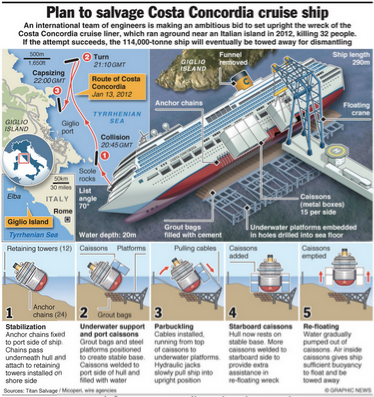Why teach organizational context to graduate
students in engineering?
by
Stephen C. Armstrong
BScEng, C.Eng, P.Eng, MA, HonDSc, FIMechE, FCGI, CMC
Professor of Innovation in the Faculty of Applied Science and Engineering,
University of Toronto
|
|
|
| What is the level of complexity of the 24 month project to raise the Costa Concordia? What level of human capability does the project manager have to have to complete the 1/2 billion dollar task successfully? |
|
The instructional setting
The Master of Engineering (MEng) program in the Faculty of Applied Science and Engineering at the University of Toronto has been designed for engineers many who have work experience whose hearts are in technical engineering but want to gain broader business, management and entrepreneurial skills taught by experienced professional engineers who have followed this path in their own careers. MEng students are from every engineering discipline including the big four; mechanical, electrical & electronic, civil, chemical; and the specialty disciplines of aerospace, computer, structural, manufacturing, environmental, biomedical, materials, building, mining, industrial etc.
Over the past six years (through August 2015) I’ve taught more than 40 courses -- both in the classroom and online -- with over 1200 engineering graduate students introducing the fundamentals of work-levels-based organization design and management.
The courses include:
- Managing innovation
- Applying innovation
- The history and philosophy of engineering
- Operations and production management and
- Organizational design.
MEng students are awarded an ELITE (entrepreneurship, leadership, innovation and technology in engineering) certificate within the MEng degree if they pass 4 courses from the ELITE stream. The MEng degree requires students to take a total of 10 courses including the Elite courses.
My story and rationale
I have had a varied career as a shop floor aeronautical engineer apprentice (UK), manufacturing engineer, engineering manager, big 5 C-Level certified management consultant, and entrepreneur.
My current purpose is to teach students to think strategically about their career and professional practice within the context of strategic management. I am developing future engineers as a transformative force in advancing organizations, society, and human progress in general. My intent is to develop inspired, value-driven engineers who see and understand the larger picture and will work to design and build a better world. I work to support them in learning proven and practical management science techniques in innovation and strategic management and they also develop the mind of the reflective engineer and their role in the greater society. They are in fact being prepared to be policy makers.
As I looked at undergraduate engineering courses, I found them almost exclusively technical (engineering science and mathematics) with little to help young aspiring engineers to understand the organizational contexts in which most of them will work as employees and nothing about the possible career paths in middle and senior management positions or as entrepreneurs. Even if they don’t aspire to a management path but to that of an individual contributor, they will still learn how to support their managers work effectively with others at various levels and to acquire skills to manage their own careers as practicing professional engineers.
After reading and talking about work-levels based organization design and management (often called Requisite Organization) over many months I perceived that the work levels approach would be the best framework that could allow graduate students to put the management of enterprise into context. And do so in a reasonable amount of time.
I have read criticisms about the work levels approach, but as someone who has worked through the hierarchy and bureaucracy from apprentice to the highest levels of management, I have found work levels to be a sound framework in which to understand the challenges in choosing a career in management with foresight and thoughtfulness.
I remember my first step into supervisory engineering management aged 26 at ABB. I knew instinctively that I was not ready to manage people directly especially the added dimension of managing professional staff in this case engineers and technicians most of whom were older than me. I used instinct and guidance from mentors and although I had the official authority as a manager it was a 5-year process before I felt truly comfortable as a leader not just administrator. These concepts would have accelerated my learning to use my authority more effectively.
Why engineering students are more likely to be receptive to and adopt the work-levels approach than other management approaches
- Engineers (and for that matter any scientifically trained professionals) value the power of univocal concept definitions.
- They value concepts that can be measured.
- They value a systems approach - and the work levels approach to organization design and management seems to be the only integrated whole systems approach available.
- They value tested methods that have been well researched and tested. (see the Requisite Organization Annotated Bibliography, a 2500 page compendium both of work levels related research and how the rest of management literature may relate to the concepts.)
Course design
I deliver the work levels concepts in my very first lecture in all my courses to establish the organizational context explaining the seven levels of work complexity and human capability. Level I is front line production work. Level II is first line management with a time span of 3-12 months. And at level V is a business unit president or with a time span of 5-10 years. I also explain how there can be non-managerial individual contributor roles at six of these levels.
I don’t teach the entire work levels theory because some students have little work experience: but rather key parts of it including:
- The levels of work in a typical engineering based organization - and possible career path options -- both managerial and individual contributor paths.
- The importance of the manager - subordinate relationship and how the new engineering employee can learn to support their manager to build the best relationship possible.
- The importance of the manager-once removed relationship (the boss’s boss)
- A few examples of typical engineering assignments with an understanding of accountability and levels of work complexity and human capability to help diagnose and sort out common project problems.
- The skilled knowledge one needs to acquire when advancing up or across the hierarchy
- The cognitive capability one must have to manage each level of work complexity
The benefits
Students that have work experience (about 90%) acquire a particular grasp for work levels concepts as they get to reflect on their own positions in the hierarchy and can identify the skills and competencies they must acquire to take on broader more complex responsibilities in the future. And they do so within a scientific context. In other words they understand that performing successfully in higher roles of management is not left to chance but can be deliberately cultivated within a robust framework. They learn that the work levels concepts helps create managerial systems that match accountability and responsibility with human capability. For example they learn that as one matures through the levels of cognitive ability that along with the skilled experience that they are able to work competently on problems.
They also learn how to assess the alignment of their personal values with the job and, organizational values and to detect when there is misalignment, and what to do about it. They learn approaches to managing change and the various socio-political management techniques.
Acquiring this knowledge provides young engineers with a proven framework that enables them to assess their own capabilities for managing increased complexity, and also serves as a reference guide for their development. It distinguishes the boss-subordinate relationships, partner relationships, and customer relationships, and it teaches how to redesign organizational roles and compensation schemes so they operate in harmony, instead of undermining each other. It helps set and more importantly manage expectations the cornerstone of stable evolving relationships.
Students gain an insight and clarity into the challenges ahead of them to build solid careers through increasing management complexity.
Insights from six years experience
Unlike undergraduate students, MEng students are enrolled in the programme to advance their career considerably by studying management courses that provide them techniques they can use on the job. The majority of students who have work experience can see the benefits of tools such as RO almost immediately. The ELITE courses provide proven methods and tools that they can apply the next day to both help their employer and in the process help advance their own roles. The work levels framework and management philosophy enables students to expand their view of enterprise management and self management.
My recommendation
For those professors that wish to provide young engineers a context in which to frame a career in management, I recommend an introductory lecture in work-levels based organizational context and then to use work levels concepts to illustrate engineering project cases as appropriate throughout the courses.







